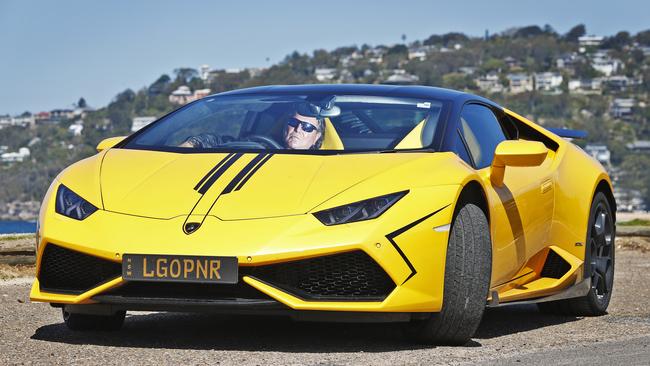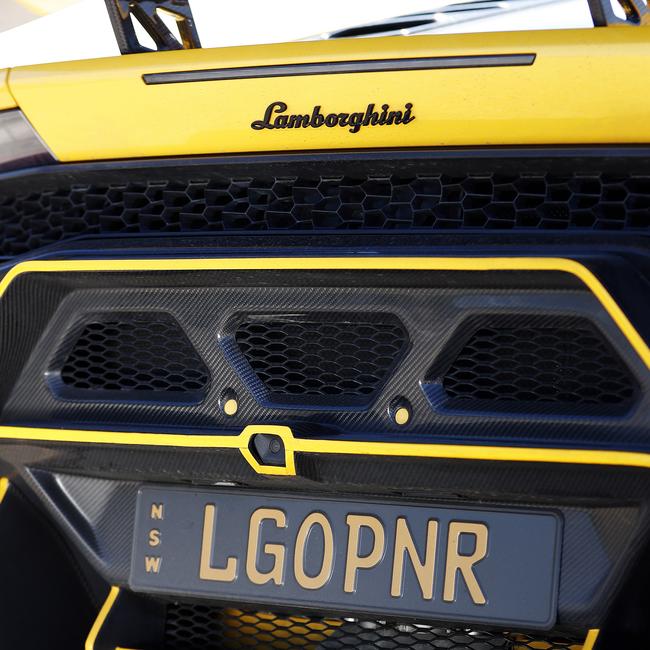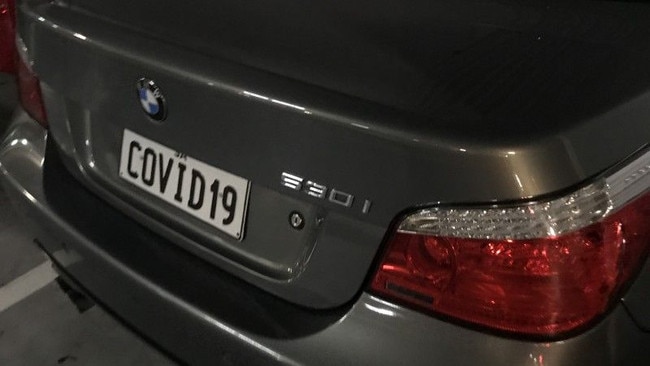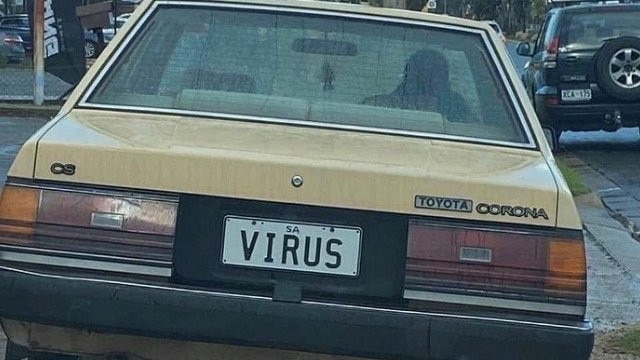What you can and can’t have on your personalised plate
The fight over a barrister’s Lamborghini shows even if you pay for a personalised plate you’re not guaranteed to get what you want.
On the road
Don't miss out on the headlines from On the road. Followed categories will be added to My News.
The Sydney barrister whose controversially cheeky number plate became a source of scandal has just over two weeks to forfeit the plates or the government is going to suspend his registration.
Despite reports that Lamborghini driving, surfski record holding, father and son saving barrister Peter Lavac had won his battle with Transport for NSW over his cheeky “LGOPNR” (leg opener) number plate, Transport for NSW safety, environment and regulation deputy secretary Tara McCarthy said on Thursday the decision to revoke his plates still stands and they expect them back in less than 18 days.

It’s unlikely he’ll pack up and move to another state but if he did he’d likely face similar problems getting the plate there, but the laws do differ in some areas around the country when it comes to what you can and can’t have on your licence plate.
NEW SOUTH WALES
In NSW the Department of Transport use an automatic process to vet number plate applications which is supplemented by manual checks.
“It is difficult to pick up every content combination which may be deemed inappropriate and on occasion some plates are inadvertently issued that give rise to controversy or public disagreement,” Ms McCarthy told news.com.au.
She added that “for the most part” the combinations are straightforward or quirky, but “there are checks and balances in place to ensure offensive and provocative content is not displayed on number plates”.

Plate combinations with “offensive language” or are of a “religious, violent, explicit or sexual nature” are monitored and refused.
Plates might also get knocked back if they are promoting unsafe driving or drinking.
When you apply for a personalised plate in NSW the department maintain ownership and you pay them for the right to display it.
The government can recall a plate if “prevailing community standards have not been sufficiently considered with respect to content on the plate”, Ms McCarthy said.
With regards to Mr Lavac’s case she said the court didn’t overturn the decision to recall the plate because “there was no jurisdiction for the court to determine an appeal”.
Transport for NSW has sent a letter to Mr Lavac requiring him to return the plates, with a little over two weeks to do so.
If he doesn’t Ms McCarthy said his vehicle registration will be suspended.
QUEENSLAND
Qld’s personalised plates are issued by Personalised Plates Queensland (PPQ), which said it complies “with strict guidelines from the Department of Transport and Main Roads”.
“We think it’s best to keep it clean and play nice on our roads” the agency said, but it maintains PPQ is “not the fun police”.
It encourages people who want to take a risk on a plate call up and check before applying in order to avoid cancellation fees if it’s knocked back.
Here’s what’s generally considered “unacceptable”:
• Plates promoting unsafe, violent or harmful behaviour, particularly on the roads, and plates referencing weapons
• Plates promoting alcohol, illegal drugs or criminal activity
• Plates that are propagandistic, discriminatory, or could offend members or citizens of a distinct culture or a particular religion, nation, race, or minority status
• Plates that could be considered offensive to Government Departments
• Plates including content that may be defamatory, in breach of any laws, regulations, rules, codes or third party rights or otherwise objectionable in the absolute discretion of PPQ
• Plates that create ambiguity in identification of a vehicle, or enables mistaken recognition of a vehicle and/or its occupants.
It’s unclear how much effort PPQ puts into monitoring this sort of thing, for instance a number plate like “FTP” (f**k the police) is likely to “promote criminal activity” and “could be considered offensive to Government Departments” but that hasn’t stopped one lucky Harley Davidson Night Rod owner having it on their registered motorbike.
VICTORIA
VicRoads are able to recall custom plates if it decides “they’re offensive, are disrespectful to the law, are inappropriate for display or they’ve been sold by mistake”.
If you’re not a lawyer like Mr Lavac and can’t fight it through the courts, you’ll at least get refunded or you can exchange the plates for something else.
Plates might get rejected because of:
• Inappropriate language, racial, religious, sexual, physical or mental health references
• Poor road safety messages
• Reference to violence or terrorist organisations
• Prohibited by “The Defence (Prohibited Words and Letters) Amendment Regulations 2000 and The War Precautions ACT Repeal ACT 1920”
• Misrepresents affiliation with an authoritative body or agency (Commonwealth, State or Territory)
• Reference to towing or the word “TOW”.
Rejected VicRoads number plates from the past include: ICEDLR (Ice dealer) and COP8TR (Cop hater — In 2014 six per cent of rejected plates were for applications mocking police according to the Herald Sun).

SOUTH AUSTRALIA
In South Australia you need a personalised plate agreement before you can order your custom plates, meaning the Department of Planning, Transport and Infrastructure (DPTI) approves it before you get it.
They tend to knock back things like swear words or things that are racially offensive or discriminatory, sexually explicit or violent, but “number plates made up of words that can be openly used in the community or in the media may be issued”.
The Registrar can also decide to revoke that approval and give you a new plate and refund what you paid to have your old one approved.
That’s what reportedly happened to the owner of a COVID 19 licence plate that appeared on a BMW sedan earlier this year.
The DPTI told the ABC the plate “unfortunately passed our approval process” but has now been blocked.
WESTERN AUSTRALIA
In WA the CEO of the Department of Transport has the right to refuse any personalised plate application.
Some reasons your application could get knocked back include if your desired plate has
“offensive, sensitive or contentious connotations (for example, sexual, violent, drug related, perverse or racial content)”.
Gang related names and anti-law sentiment (particularly with regards to road safety laws) are likely to be rejected.
If you try to get a plate with the same registered name as a company or business that you’re not the director of that can also be rejected.

NORTHERN TERRITORY
The NT has the usual objections to offensive language and things that are violent or sexually explicit or discriminatory, but it has a few weird caveats as well.
While some states recommend doing it if you can’t get the plate combination you want, the NT prohibits you using “any combination of numbers or letters or substitution of numbers or letters where there is the potential for misrepresentation or any possibility of the plate being mistaken for another plate”.
Using a 1 or 0 where it could be mistaken for an I or O, or replacing an S with a 5 for instance.
You also can’t have the name of countries or initials for names of other states.
Plates with a similar name as government departments or agencies are also banned.
The plate could also be rejected based on the make and model of your car if combining them were to make it offensive.
But the state, perhaps due to its low case numbers, is fine with pandemic themed plates, granting a “COVID 19” plate in March as well as other plates like “COVID” and “PNDEMIC”.
AUSTRALIAN CAPITAL TERRITORY
The ACT refuses any number plate “where it considers that the content would cause offence to a reasonable person”.
TASMANIA
TasPlates takes care of personalised plates on behalf of the government in Tasmania, but along with the Registrar of Motor Vehicles it has “absolute discretion” over what plates can be manufactured and the right recall any that are considered inappropriate or offensive, even after they’ve been issued.
The usual bans on obscene or indecent language applies as well as for plates that promote unsafe behaviour.
Plates that are discriminatory, potentially offensive to government departments, or could be considered defamatory in nature are also prohibited.
Originally published as What you can and can’t have on your personalised plate
